The Georgetown Law Journal Presents Symposium on “Law and the Nation’s Health”
October 22, 2019
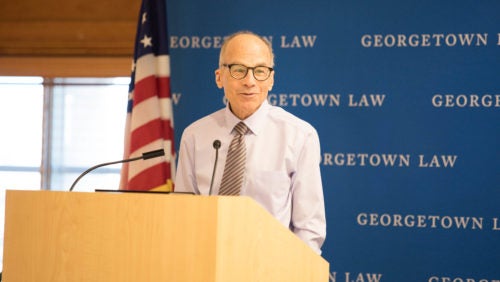
University Professor Lawrence Gostin, the founding faculty director of Georgetown Law's O'Neill Institute for National and Global Health Law, was honored at the Georgetown Law Journal symposium on October 14.
When the student editors of The Georgetown Law Journal wanted to present their Volume 108 Symposium on “Law and the Nation’s Health,” they reached out to experts at institutions including Yale Law School, the University of Virginia School of Law, George Mason University Antonin Scalia Law School, the University of Pennsylvania, Harvard University and Harvard Law School, and the University of Missouri School of Law.
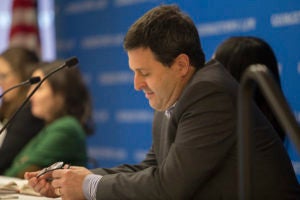
Professor David Hyman.
But many professors in their powerhouse lineup had to travel no farther than the Hotung International Law Building or McDonough Hall — because they were already at Georgetown Law.
Experts such as keynote speaker, University Professor Lawrence Gostin, the founding faculty director of Georgetown Law’s O’Neill Institute for National and Global Health Law whose many roles include pioneering the field of global health law. Experts such as Professor David Hyman, a doctor, who discussed how to protect patients from surprise medical bills and how to make health care affordable. Experts such as Professor M. Gregg Bloche, a doctor and author of The Hippocratic Myth: Why Doctors Are Under Pressure to Ration Care, Practice Politics, and Compromise Their Promise to Heal (St. Martin’s Press, 2011). Bloche described current research undertaken with Professor Neel Sukhatme to change the future of innovation in health care, replacing a one-size-fits-all patent system to one tied to therapeutic impact. Experts such as Professor Nan Hunter, who led a panel on “The Law of Women’s Health and Equity.” Adjunct Professor John Monahan, Senior Advisor for Global Health to Georgetown University President John J DeGioia, delivered the opening remarks. And Professor from Practice Timothy Westmoreland, who played a role in developing the Affordable Care Act, attended a panel exploring that statute.
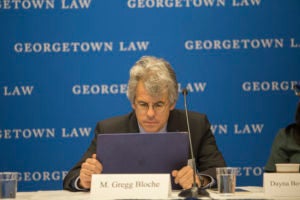
Professor M. Gregg Bloche.
With the assistance of Georgetown Law’s O’Neill Institute for National and Global Health Law, “the Journal has been lucky enough to assemble panels from world-class experts on these topics, and we are lucky enough to recognize the important [work of Professor Gostin]…who has made an incalculable contribution to the field of health law,” said Executive Symposium Editor Caitlin Haynes (F’17, L’20), who helped organize the event along with Editor-in-Chief Grace Paras (L’20).
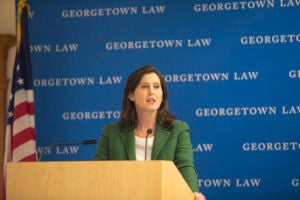
Yale Law Professor Abbe Gluck.
Many other experts played a significant role: the symposium topic was proposed by University of Missouri School of Law Professor Sam Halabi, who is also a scholar at Georgetown Law’s O’Neill Institute for National and Global Health Law. Monica Coscia (L’20), an Executive Articles Editor for the Journal, contributed a student note to the volume — one of the first papers to present a 50-state survey on the application of Daubert v. Merrill Dow Pharmaceuticals, the Supreme Court case governing expert testimony, to medical malpractice cases.
The editors and staff of The Georgetown Law Journal will edit pieces by many of the experts listed above, and they will be printed in the corresponding symposium issue of the Journal, to be published in the summer of 2020.
Health with Justice
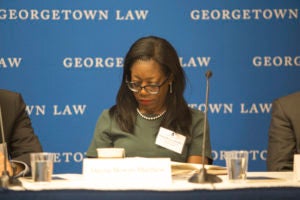
Professor Dayna Bowen Matthew of University of Virginia School of Law.
The event honored Professor Gostin’s significant contributions to the field of health law around the world. Monahan began the day by praising Gostin’s “incredible legacy”: “the power of law to make a difference, the power of law to shape different health outcomes for people in our country.”
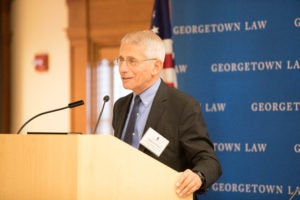
Dr. Anthony Fauci standing at podium.
Dr. Anthony Fauci, Director of the National Institute of Allergy and Infectious Diseases who helped create the President’s Emergency Plan for AIDS Relief (PEPFAR) in the early 2000s, introduced Gostin’s luncheon keynote address: “[His] unwavering commitment to national and global health security are demonstrated by key leadership roles advising just about everybody who plays a major role: the [National Institutes of Health, the National Academy of Medicine, the National Research Council, [the World Health Organization], the World Bank, a number of other agencies that were involved in a wide range of public health threats from the opioid crisis to global HIV pandemic, Zika, cancer, pandemic flu…,” Fauci said. “I literally had the privilege of learning from Larry as I watched him navigate through these extraordinary problems…global health with justice has been the tie that binds Larry’s career.”
In his keynote, Gostin addressed how to achieve health with justice as outlined in his book, Global Health Law (Harvard University Press, 2014). Interviewing a teenage girl in Uganda who lived without plumbing and electricity or a Montana boy on an Indian reservation facing challenges of addiction, he discovered that both had lost hope for a better life. While an ideal state of health includes universal health coverage, doctors and insurance are only one part of what makes us healthy: we need infectious disease control, injury control, clean water, good food, safe roads, education, employment, and housing. “If you asked any epidemiologist in the world…what is the single greatest predictor of good or bad health, I think many of you would know the answer,” Gostin said. “It’s the zip code. It’s where you live…and that’s truly unjust.”